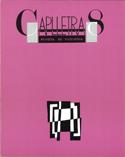La sintaxi de la conjugació en català
DOI:
https://doi.org/10.7203/caplletra.8.7749Keywords:
sintaxi catalana, sintaxi de la conjugació, «consecutio temporum» Abstract
Abstract
By "inflection" we usually understand morphological paradigms that constitue verbal casuistic. Syntax, as is normally understood, seems far from that. Instead of investigating the differences, I should concentrate on similarities. Perhaps "the sequence of tense" or the "consecutio temporum" would be better titles for this paper. It has been said that both inflection and syntax play an important role in the definition of sentences. The problem is who is going to give a definition of "consecutio temporum" today. Here I assume a model like Chomsky (1986) in order to explain the interaction between the Complementizer Phrase (as a mood marker) and the Inflection Phrase (both a morphological device and the head of the sentence). The starting point is represented by the work of T. Stowell (1981). I include also, finally, some comments on the kind of regularities we can find in the Inflection Phrase of Romance languages.
 Downloads
Downloads
Downloads
How to Cite
-
Abstract476
-
PDF (Català)447
Issue
Section
License
Authors submitting work to Caplletra for publication must be the legitimate holder of the usage rights. Legitimacy for the purposes of publishing the work must also include images, tables, diagrams and any other materials that may complement the text, whether they are the author of such material or not.
Copyright: on publishing their work in the journal, the author grants Caplletra. Revista Internacional de Filologia usage rights (reproduction, distribution and public communication) for both the paper printed version and for the electronic version.
All work published in Caplletra is covered by the Creative Commons license type Attribution-NonCommercial-NoDerivatives 4.0 (CC BY-NC-ND 4.0).
RESPONSABILITY
Caplletra. Revista Internacional de Filologia does not necessarily identify with the points of view expressed in the papers it publishes.
Caplletra. Revista Internacional de Filologia accepts no responsibility whatsoever for any eventual infringement of intellectual property rights on the part of authors.






